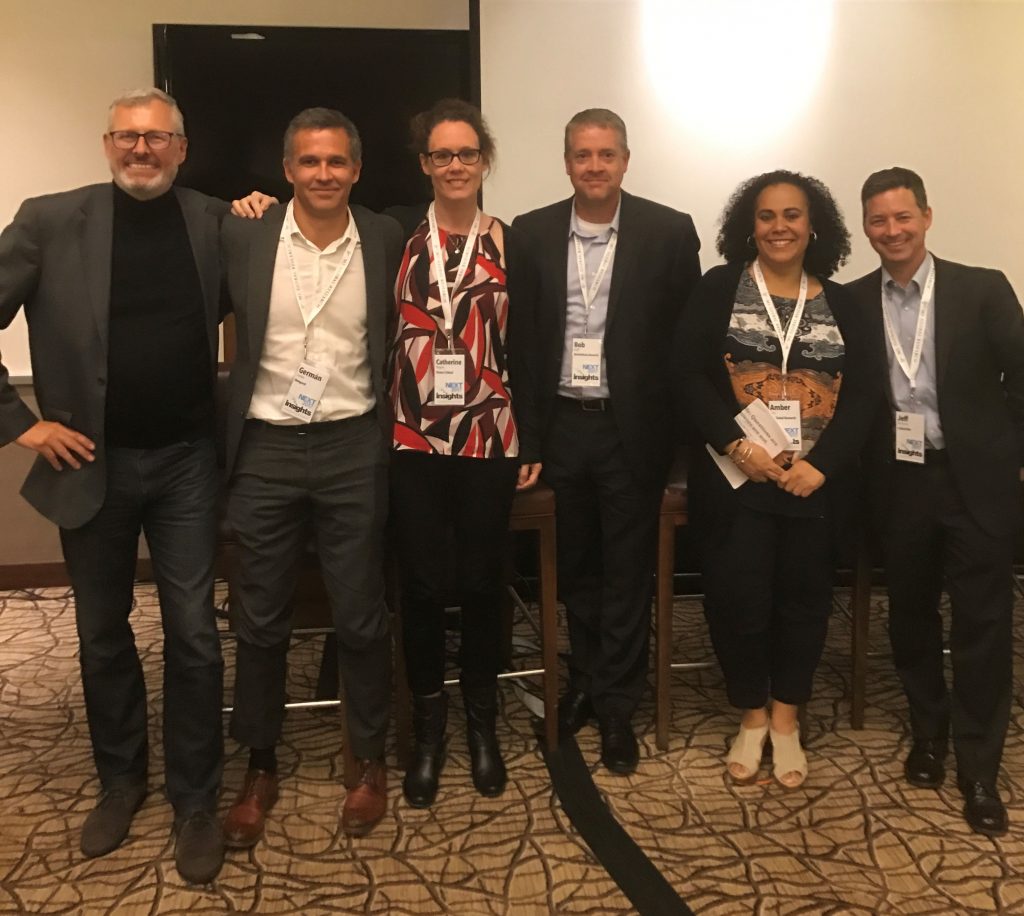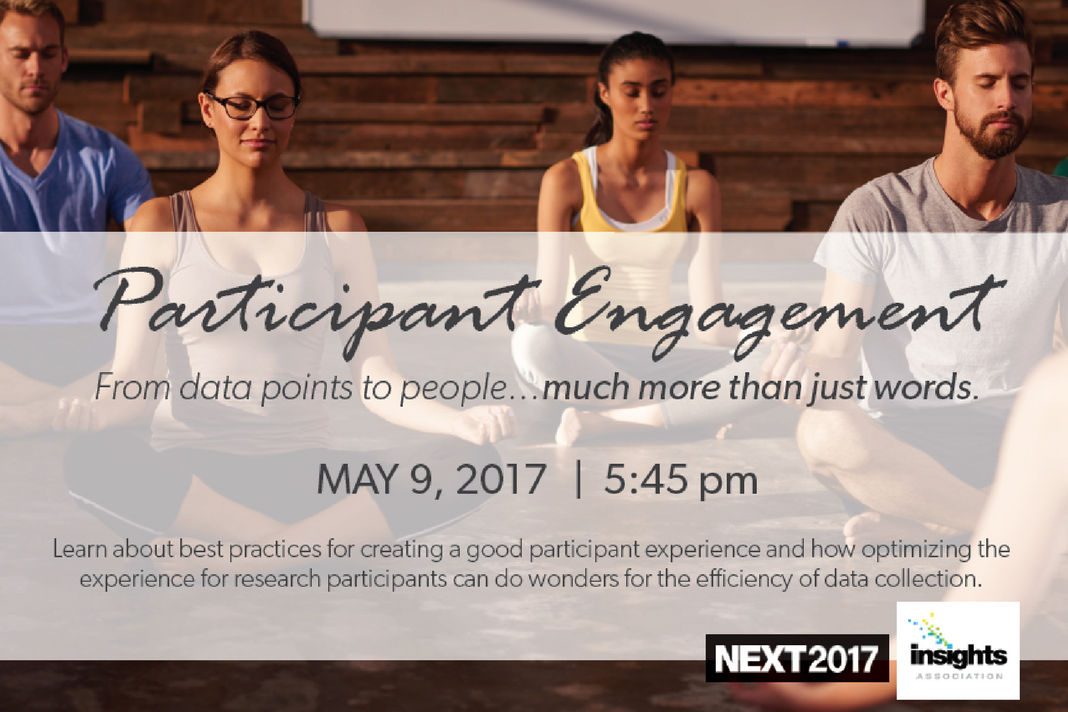At the Insights Association’s NEXT Conference in New York last week our distinguished panel of experts from Critical Mix, M3 Global Research, MarketVision, Netquest and Vision Critical shared provocative thoughts, and concrete advice, with a packed audience on what needs to be done to improve the user experience and increase participant engagement.

Left to right:
Andrew Cannon (GRBN), Germán Loewe (Netquest), Catherine Rogers (Vision Critical), Bob Graff (MarketVision), Amber Leila Esco (M3 Global Research), Jeff McKenna Critical Mix
To kick things off, Germán reminded us how the competition for people’s time online, and in particular on their smart phones, has changed beyond recognition: “
When we launched our first online panel, taking surveys was one of the most fun things you could do online”. Few would argue that that is the case today as we compete with the likes of Youtube, Facebook and Instagram for a slice of people’s time. Germán advised the audience to pay participants a fair, non-monetary, incentive and restrict the number of invites any person in the panel receives in order to improve both participant engagement and data quality.
Catherine invited us to think about why people participate in research in general, and in online communities in particular, and reminded us of that many people are motivated out of a desire to influence things: “
By making people feel heard and empowered, we can significantly improve participant engagement.” Catherine advised that we should share back results with participants regularly with timely, relevant and compelling content, and gave some concrete examples on how this can be done:
- Invites to surveys: Provide insights/results from previous studies or share insider information in the invite.
- Shareback Blogs / Forums: After a study is finished, publish and share a blog with participants that includes key findings and what the findings results in from a brand perspective. Or post a few key results on a forum and allow participants to talk about them.
- In-activity/In Survey: Provide insights, results or insider information during or at the end of a survey
- Feedback surveys: Create a survey that actually provides results in a fun gamified approach and send to participants that did the original survey.
- Instant feedback questions: Include a question that provides instant results in a survey so participants can feel that they have left the survey at least knowing results to one question they answered.
The panel noted that many of ideas can and should be used in connection to online surveys, not just online communities, and challenged the audience to do so in their upcoming projects.
You can read more of Catherine’s thoughts on “
Why customer experience matters in market research” here.
Bob reminded us that our industry has been focused too much on excluding people from surveys, rather than trying to include them, leading to serious consequences for data quality. Bob provocatively stated that “
the future of surveys is not mobile”, pointing out instead that “
the future is in designing a consistent experience to a participant regardless of device or platform.” Bob talked about the work they have done at MarketVision to make surveys device agnostic, and he specifically referenced the work they have done with respect to The Americans with Disabilities Act (
ADA) and the upcoming ADA mandates to ensure that the visually impaired and blind can participate in research.
You can read more about Bob’s thoughts on inclusiveness in research
here.
Amber talked to her experience of researching healthcare practitioners, where there is a finite universe and therefore a need to maximize participant engagement. Amber challenged the industry to “
reduce the number of screening questions and push back on clients who want more.” Amber recommended that as a standard rule of thumb, unless participants can terminate based on their answer, that we do NOT ask the question in screening. Amber also advised us to allow data collection to pre-load static answers, such as “date of birth” and “year residency completed” and to allow physicians to
complete or confirm their details.
Provocatively, Amber suggested to go a step further and introduce universal ID codes; “
while each HCP panel has unique nuances there is overlap on all of these panels. If as an industry, we can work to have an independent “council” track data and assign ID numbers on HCPS, it would only benefit all of us and all of our clients as well.”
The panel noted that long screeners are also a major complaint among general population panelists. Also, response rates are currently so low among the general public, that we all would do well to treat anyone who wishes to participate in research with the respect afforded to healthcare professionals and other low-incidence groups.
Jeff started out by informing the audience that they call their panellsts “members” and see them as a valuable resource: “
given the choice, Critical Mix (as a sample provider) much prefers to have our members have a positive survey experience over a negative one.”
Jeff saved perhaps the most provocative point to last: “
I wish we had a method to force research customers to pay additional charges for poor survey experiences – think of it as a damage fee”. Turning this around, it is certainly possible to increase the recognition we give to “good performing” clients, who create experiences which build participant engagement, rather than destroy it, for example through awards.
You can read more of Jeff’s thoughts on the falling cost of market research data
here.
A great question from the audience was: “
What about clients? Nothing will change until clients care.” Three clients in the audience answered the challenge, stating that they do care, and are making efforts to improve the user experience. In particular, one of the clients, who regularly surveys their own customers, mentioned that creating a great user experience was of critical importance to them. Perhaps, we need to apply the UX learnings from best-in-class customer experience research to all types of research?
The feedback from the audience afterwards was fantastic and the conversations continued over drinks in the exhibition hall. We would like to thank the panelists for their contribution to our effort to increase participant engagement and drive up response rates.
If you would like to find out more about the GRBN Participant Engagement Initiative or get involved
drop us a line.
 Left to right:
Andrew Cannon (GRBN), Germán Loewe (Netquest), Catherine Rogers (Vision Critical), Bob Graff (MarketVision), Amber Leila Esco (M3 Global Research), Jeff McKenna Critical Mix
To kick things off, Germán reminded us how the competition for people’s time online, and in particular on their smart phones, has changed beyond recognition: “When we launched our first online panel, taking surveys was one of the most fun things you could do online”. Few would argue that that is the case today as we compete with the likes of Youtube, Facebook and Instagram for a slice of people’s time. Germán advised the audience to pay participants a fair, non-monetary, incentive and restrict the number of invites any person in the panel receives in order to improve both participant engagement and data quality.
Catherine invited us to think about why people participate in research in general, and in online communities in particular, and reminded us of that many people are motivated out of a desire to influence things: “By making people feel heard and empowered, we can significantly improve participant engagement.” Catherine advised that we should share back results with participants regularly with timely, relevant and compelling content, and gave some concrete examples on how this can be done:
Left to right:
Andrew Cannon (GRBN), Germán Loewe (Netquest), Catherine Rogers (Vision Critical), Bob Graff (MarketVision), Amber Leila Esco (M3 Global Research), Jeff McKenna Critical Mix
To kick things off, Germán reminded us how the competition for people’s time online, and in particular on their smart phones, has changed beyond recognition: “When we launched our first online panel, taking surveys was one of the most fun things you could do online”. Few would argue that that is the case today as we compete with the likes of Youtube, Facebook and Instagram for a slice of people’s time. Germán advised the audience to pay participants a fair, non-monetary, incentive and restrict the number of invites any person in the panel receives in order to improve both participant engagement and data quality.
Catherine invited us to think about why people participate in research in general, and in online communities in particular, and reminded us of that many people are motivated out of a desire to influence things: “By making people feel heard and empowered, we can significantly improve participant engagement.” Catherine advised that we should share back results with participants regularly with timely, relevant and compelling content, and gave some concrete examples on how this can be done:







